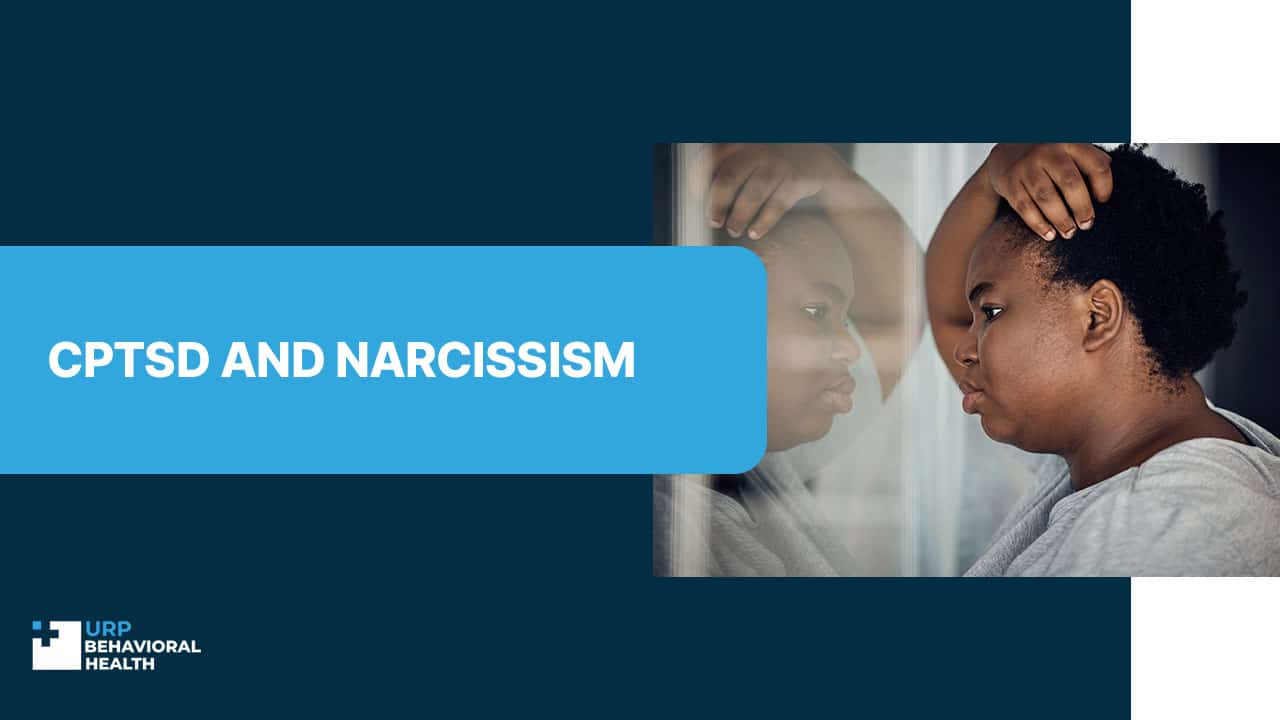
CPTSD and Narcissism
Surviving after traumatic experiences can be hard because our psyche tends to boost after the experience is overcome with specific issues. Post-traumatic stress disorder and its complex version, typically called PTSD are among such issues. They deeply change the whole lifestyle and manifest in multiple symptoms that can make the life of a PTSD person and their family truly unbearable. Yet, why then do some people who survived trauma act like completely selfish or even narcissistic human beings? Let’s compare two diagnoses: CPTSD vs Narcissism to decide whether they are comorbid, correlated, or have nothing in common at all. Read more in our URP Behavioral Health blog article.
Can CPTDS Look Like Narcissism? The Core Similarities Leading to Misdiagnosis
Both CPTSD and narcissism can stem from traumatic experiences. In some cases, trauma leads to the development of narcissistic symptoms, which can further grow into a more complex NPD diagnosis. These symptoms often mimic those of PTSD [1], for example, estranging from others can be a common symptom for both these issues. Coldness or on the contrary, a persistent wish to be good for everyone also are among such mimic symptoms. Yet, this rule doesn’t work in 100% of issues as the spectrum of symptoms for CPTSD and NPD is diverse and variable.
Our team will verify your insurance and design a plan tailored to your needs.

Differences Between CPTSD and Narcissism
First, what is the difference between complex post-traumatic stress disorder and narcissism? Several distinctive features can help you to discriminate one disorder from another.
- Length of manifestation. Although CPTSD typically has long-lasting effects which can follow an individual through the whole life span, mostly its symptoms tend to fade with time. It doesn’t work similarly with narcissistic traits which remain a part of personality forever.
- Roots. Although both CPTSD and narcissism can grow on the basis of continuing and intensive traumatic stress, for narcissism this cause is not the only one possible. NPD can develop based on genetic reasons or on specific types of parenting (for example, the possibility of growing a narcissistic child in a family practicing so-called ‘helicopter’ parenting is high enough [2]).
- Recognition. CPTSD is not officially included on the DSM-5 list while NPD is included. CPTSD is regarded by the ADA as a special case of PTSD.
- Several symptoms also vary for CPTSD and NPD.
Symptoms of CPTSD vs Narcissism: Comparing the Essences
So, how can you guess, which type of mental health disorder you or your loved one have: CPTSD or narcissism? Let’s check their core symptoms.
For complex post-traumatic stress disorder, these symptoms are as follows [3]:
- Regular feelings of shame, guilt, and worthlessness.
- Low connection with other people.
- Emotional management issues and low emotional control.
- Difficulties with building healthy relationships based on equality, love, and respect.
These symptoms can be accompanied by classic PTSD symptoms like flashbacks, attempts to avoid traumatic or triggering situations, headaches, nightmares, dissociative states, etc. All that is caused by such factors as long-lasting traumatic experiences due to child abuse, sexual abuse, neglect, sex trafficking, slavery or war conflict.
In the case of narcissism or its developed Narcissistic Personality Disorder, the symptoms are:
- Exceeded sense of self-importance and value;
- Feeling of being exceptional and better than other people;
- Emotional deafness and low empathy;
- Problems with emotional control;
- Manipulative behavior and inability to build a healthy relationship based on equality, love, and respect;
- Painful behavior towards family and close circle of people embodied in requirements to admire a narcissistic person and constantly approve of their achievements and merits.
As you can see, only a couple of symptoms intersect when it comes to NPD and complex PTSD. Both diagnoses make a person estranged but seeking support from others but in the case of narcissism, this support must be wrapped in a shell of admiration and worship while CPTSD persons simply need to be heard and supported. Both these diagnoses also make individuals emotionally unstable. Still, for NPD persons, this lack of emotional control happens when they don’t get the admiration they seek while in CPTSD, emotional destabilization can be caused by triggering events or people who remind them about trauma.
One more common symptom is disruptive relationships. Both NPD and CPTSD patients cannot build healthy relationships with people but while CPTSD patients can be compensated by the therapy to improve this, narcissists do not accept they have troubles and their treatment requires time and patience to get the slightest results.
Treatment for CPTSD and Narcissism: How to Help Your Loved Ones
The treatment for CPTSD and Narcissism even if both conditions are induced by a childhood trauma, is different.
Reach out today and let us create a treatment plan designed around your needs.

When talking about C-PTSD, the most effective treatment includes:
- medication management, particularly, antidepressants, anxiety-reducing drugs, and medications for specific symptoms’ mitigation;
- trauma-focused CBT;
- EMDP techniques;
- lifestyle changes to reduce the possibility of facing triggers.
For NPD, medication therapy is prescribed only if a patient has ongoing depression or suicidal thoughts. In other cases, the therapy is targeted to change destructive behavioral patterns. That’s why for narcissism, various psychotherapy practices can be used including as following:
- CBT;
- DBT;
- Metacognitive therapy;
- Psychodynamic therapy;
- Group therapy.
Summaries
CPTSD and Narcissism can stem from long-lasting childhood trauma. Yet, for NPD, that’s just one of the causes among others. These two disorders provide patients with an inability to build relationships on a healthy background and they feature a lack of emotional control. Moreover, in some cases, NPD can mimic CPTSD, but the therapy for them is radically different. That’s why it is important to undergo proper diagnostics to distinguish the disorder you have and get a relevant treatment. In our treatment center, we have specialists who successfully diagnose both CPTSD and NPD, provide their author’s plans, and adjust them to meet the unique requirements of each patient. With us, you can make your life quality better and reduce the consequences of your previous traumatic experience that led to NPD or CPTSD.
We’ll help you understand your options and guide you toward care.
Resources:
- Distinguishing trauma-associated narcissistic symptoms from posttraumatic stress disorder: a diagnostic challenge (2002)
https://pubmed.ncbi.nlm.nih.gov/11751643/ - How Helicopter Parents Hurt Their Children (2024)
https://www.psychologytoday.com/intl/blog/childhood-narcissism/202409/how-helicopter-parents-hurt-their-children - Complex PTSD – Post-traumatic stress disorder (2022)
https://www.nhs.uk/mental-health/conditions/post-traumatic-stress-disorder-ptsd/complex/
















